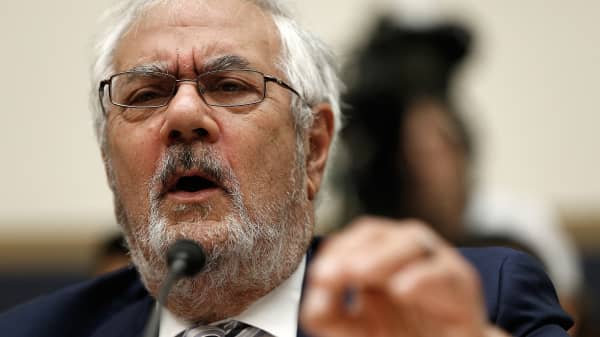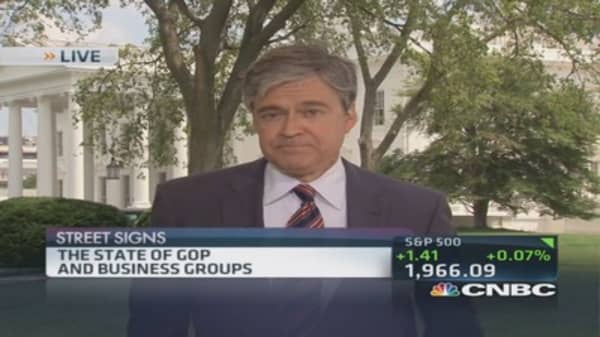Clichés get a bad rap. There is a danger that people will repeat them mindlessly, but a phrase does not get to be a cliché without having a good deal of validity over time. There is one that is particularly relevant for the business community in this year's mid-term election: Be careful what you wish for.
Many businesses, especially those in the financial community, still resentful of the financial-reform bill and critical comments made by President Obama about their behavior are working to elect a Republican Senate. In addition to some deregulation, some hope that this will lead to favorable tax changes.
But if the Republicans do get control of both the House and the Senate, the impact is very unlikely to be in those two areas and it is more probable that it will mean reversed support for policies the business community will not welcome.
Read MoreWhat's at stake in a NC Senate debate? Plenty
The business community should not get its hopes too high about dilutes of financial regulations. Republicans can insert into appropriations bills language that will cut back in this area but I doubt they will have the power to make it stick. A presidential veto of an appropriations bill on the grounds that it severely damaged the effectiveness of the Consumer Financial Protection Bureau would be politically very popular, and I doubt very much that the Republicans would be able to muster the political support to insist on shutting down the government — unless the president gave in. It also wouldn't be hard for the president to rally support against what would be accurately characterized as an effort to re-deregulate derivatives.
On the other hand, there are several policy areas where it is clear that Republican control of both houses of Congress would cause problems for the business community's agenda. The likeliest to stick would be cutting back on the president's efforts to insert more flexibility into the immigration laws. It is indisputable that the prospect of the changes in immigration rules that most businesses favor would disappear.
Similarly, where there may be a short-term extension of the Export/Import Bank this year, Republican control of both houses of Congress would put its continuation in doubt. Terrorism Risk Insurance, which we adopted at the request of those interested in seeing the continued construction of large buildings in our big cities would also be endangered. The president can veto something he doesn't like, but he cannot force the passage of something that he supports.
Read MoreWhy GOP lite in November is good for Wall Street
Another obvious casualty of Republican control in both houses of Congress would be any effort to replace the current situation of housing finance with a system that included some means for lenders to purchase from the federal government a hedge against interest-rate risk over a 30-year mortgage. The dominant faction on the House Financial-Services Committee condemns any such arrangement as an intolerable interference with free enterprise. Everyone with whom I have discussed this who has anything to do with building, leasing, or financing houses believes that this is a recipe for ending the availability for 30-year fixed-rate mortgages.
Another fraught area is the continued viability of international financial institutions to help cope with economic crisis. At the height of the European crisis, my Republican colleagues tried to forbid the International Monetary Fund from being part of the coalition trying to alleviate that problem by legislating a cutoff of American contributions. And those in the business community who are fans of having the general accounting office audit the interest-rate-setting policies of theFederal Reserve — including asking members on the Federal Open Market Committee why they voted as they did — should also be looking forward to a bicameral Republican majority.
Read MoreOp-ed: Obama's magic number is 40
For much of my time as the leading Democrat on the Financial-Services Committee, I cooperated with people in the business community to preserve policies such as terrorism-risk insurance; the independence of the Federal Reserve's monetary-policy function; the Export/Import Bank; and American support for a rational international financial structure. But I can report that many Democrats are wearying of coming to the defense of these policies, at the request of various business entities, only to be attacked by Republican opponents on these very points — especially when those opponents are being financed by elements the Democrats have been trying to help.
If the election results in a Congress controlled by a Republican majority still heavily influenced by the Tea Party, the result may well be a move in the direction of a rigid free-market absolutism that will claim as its victims many of the policies that the business community has supported. Those who help to create such a majority if it comes to pass should not be surprised when Democrats show little enthusiasm for protecting the business community against it's the beneficiaries of its heavy financial support.
Commentary by Barney Frank, chair of the House Financial-Services Committee from 2007 to 2011, during which time Congress enacted the TARP program and the financial-reform bill known as Dodd-Frank. Follow him on Twitter@BarneyFrank.




